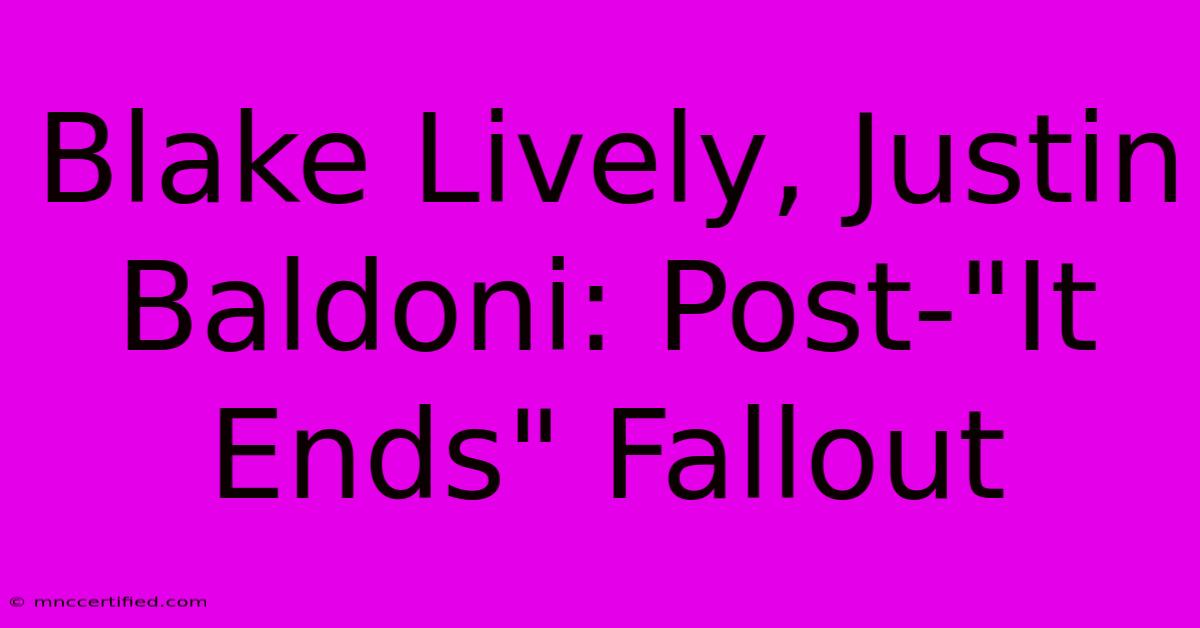Blake Lively, Justin Baldoni: Post-"It Ends" Fallout

Table of Contents
Blake Lively, Justin Baldoni: Post-"It Ends with Us" Fallout: Exploring the Fan Reactions and the Deeper Issues
The Colleen Hoover adaptation, "It Ends with Us," starring Blake Lively and Justin Baldoni, ignited a passionate—and sometimes controversial—response from fans. While the film itself garnered considerable attention, the post-release discussions surrounding the actors and their portrayals have revealed a complex interplay of expectations, interpretations, and the sensitive nature of the source material. This article delves into the post-"It Ends with Us" fallout, analyzing fan reactions and the broader implications of adapting such a sensitive story for the screen.
The Source Material and Expectations: A High Bar to Clear
Colleen Hoover's "It Ends with Us" resonated deeply with readers due to its unflinching portrayal of domestic abuse and the complexities of trauma. This built immense anticipation for the film adaptation, placing a significant weight of expectation on the actors, particularly Blake Lively as the protagonist, Lily Bloom, and Justin Baldoni as the antagonist, Ryle Kincaid. The pressure to accurately represent the emotional nuances of the characters and the gravity of the subject matter was immense.
Fan Reactions: A Spectrum of Opinions
The online discourse following the film's release showcased a wide range of reactions. Some viewers lauded Lively and Baldoni's performances, praising their ability to convey the emotional turmoil of their respective characters. Others voiced disappointment, citing concerns about the film's deviations from the book, the perceived underdevelopment of certain characters, or the portrayal of certain aspects of domestic abuse. The intensity of these reactions highlights the deeply personal connection many readers felt with the original novel and their individual interpretations of its themes.
Analyzing the Performances: Lively, Baldoni, and Beyond
Blake Lively's portrayal of Lily Bloom received both significant praise and criticism. Many viewers appreciated her vulnerability and emotional depth. Others argued that her performance lacked a certain rawness or believability. Similarly, Justin Baldoni's performance as Ryle Kincaid sparked debate, with some seeing him as convincingly manipulative and others criticizing his portrayal as lacking in depth or nuance. This disparity in interpretation emphasizes the subjectivity of acting and the challenges of presenting a complex character like Ryle to a diverse audience.
Beyond the Actors: Production Choices and Narrative Adaptations
The online discussion extended beyond the actors' performances, encompassing the film's overall production choices and adaptations of the source material. The narrative structure, pacing, and certain plot points drew criticism from some viewers who felt they deviated too greatly from the book's essence. These criticisms underline the complexities inherent in adapting a beloved novel to the big screen, balancing fidelity to the original work with the needs of a cinematic narrative.
The Broader Discussion: Representation and the Sensitivity of Domestic Abuse
The intense reaction to "It Ends with Us" transcends mere fan feedback; it underscores the importance of responsible storytelling when addressing sensitive issues like domestic abuse. The film’s reception sparked conversations about the portrayal of such sensitive themes in popular media, raising questions about the potential for both educating and misrepresenting viewers. The debate surrounding the film’s effectiveness in achieving this delicate balance continues to be a crucial discussion point.
Conclusion: A Legacy of Dialogue
The post-"It Ends with Us" fallout serves as a case study in the complex relationship between literary adaptations, fan expectations, and the critical appraisal of sensitive subject matter. While the film sparked controversy, the ensuing discussion has fostered important conversations about representation, the ethical considerations of portraying domestic abuse, and the inherent challenges of adapting beloved books for the screen. The lasting impact of this film, therefore, extends beyond its box-office success to a larger conversation about responsible storytelling and the enduring power of literature.

Thank you for visiting our website wich cover about Blake Lively, Justin Baldoni: Post-"It Ends" Fallout. We hope the information provided has been useful to you. Feel free to contact us if you have any questions or need further assistance. See you next time and dont miss to bookmark.
Featured Posts
-
Nottingham Forest Win Brentford Report And Analysis
Dec 22, 2024
-
Brentford Vs Forest 0 2 Victory For Forest
Dec 22, 2024
-
Chiefs Mahomes Leads Nfl Ravens Triumph
Dec 22, 2024
-
When Is Luke Littler Playing Tonight
Dec 22, 2024
-
Ohio State Vs Oregon Rose Bowl Odds
Dec 22, 2024